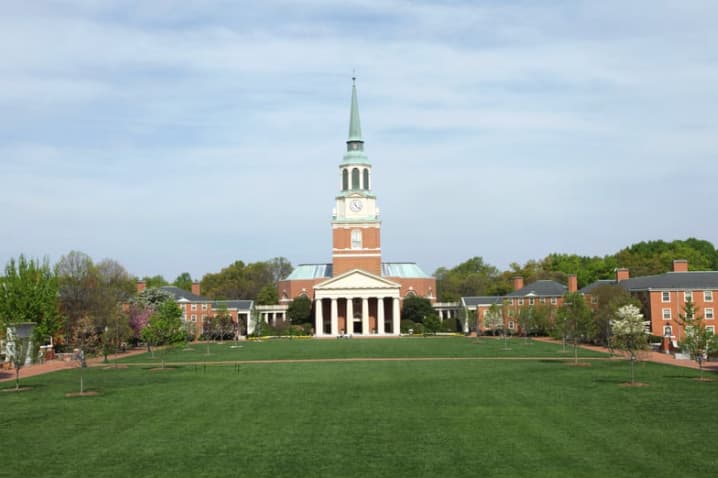
Wake Forest University Writing Supplements
Prompt 1. List five books you’ve read that have intrigued you. (150 character limit per book title)
Example:
Sapiens: A Brief History of Humankind by Yuval Noah Harari. It made me question the stories we tell ourselves to build societies, from laws to money.
The Man Who Mistook His Wife for a Hat by Oliver Sacks. These clinical tales revealed the fragile, bizarre, and beautiful ways the human brain creates reality.
Frankenstein by Mary Shelley. I was intrigued by the question of who the real monster was: the creation or the creator.
Exhalation: Stories by Ted Chiang. The blend of physics and philosophy in these stories made me think about free will in a whole new way.
How to Do Nothing: Resisting the Attention Economy by Jenny Odell. This book challenged my ideas about productivity and the value of simply paying attention.
Prompt 2. Tell us what piques your intellectual curiosity or has helped you understand the world’s complexity. This can include a work you’ve read, a project you’ve completed for a class, and even co-curricular activities in which you have been involved. (150 word limit)
Example:
My intellectual curiosity was sparked by a failed project in my school’s community garden. Our goal was simple: build a self-watering system for the tomato beds using recycled bottles. We followed online tutorials, but our system either flooded the plants or left them dry. I became obsessed with figuring out why.
I spent weeks researching soil density, capillary action, and evaporation rates. I learned that the online guides were a starting point, not a solution. Our specific soil, the angle of the sun, and even the type of plastic bottle all mattered.
The world’s complexity, I realized, isn’t in the grand theories, but in the infinite variables of a local problem. A perfect solution on paper fails without an understanding of its specific context. This experience taught me to stop looking for universal answers and start paying attention to the details on the ground.
Prompt 3. Dr. Maya Angelou, renowned author, poet, civil-rights activist, and former Wake Forest University Reynolds Professor of American Studies, inspired others to celebrate their identities and to honor each person’s dignity. Choose one of Dr. Maya Angelou’s powerful quotes. How does this quote relate to your lived experience or reflect how you plan to contribute to the Wake Forest community? (300 word limit)
Example:
Quote: “I've learned that people will forget what you said, people will forget what you did, but people will never forget how you made them feel.”
This quote from Dr. Angelou reminds me of my biggest failure as a leader. In my junior year, I was elected captain of my debate team. My goal was singular: win the state championship. I was efficient and direct. I created detailed research schedules, ran relentless practice drills, and gave blunt feedback on everyone’s performance. We were technically better than ever, but the mood in our meetings grew tense and quiet. We lost in the semi-finals, and no one seemed to care.
I had focused entirely on what we did, and I had forgotten how I was making my teammates feel: like cogs in a machine. The joy was gone. The following season, I changed my approach. I started our meetings by asking about everyone’s week. I organized team dinners. I paired experienced debaters with novices not just for practice, but for mentorship. I focused on building a supportive community first, and a winning team second. The change was immediate. Laughter returned to our meetings, and so did our competitive fire. We made it to the state finals, and though we lost a close match, the feeling was completely different. We were proud of each other.
At Wake Forest, I want to bring this understanding to my community. I am drawn to the motto Pro Humanitate, and I hope to live it out by joining the Office of Civic & Community Engagement. I want to be a part of projects where the goal is not just to complete a task, but to build lasting, positive relationships. I learned that the most important results are not always the ones you can measure.
Prompt 4. Give us your Top Ten List. (The choice of theme is yours.) (100 character limit per line)
Example:
Theme: Top Ten Small, Satisfying Fixes
1. Perfectly aligning a crooked picture frame on the wall.
2. Untangling a hopelessly knotted necklace chain.
3. Getting the last bit of ketchup out of the bottle.
4. Finding the exact Lego piece you were looking for.
5. When a squeaky door finally stops squeaking.
6. Peeling an orange in a single, continuous spiral.
7. Solving a crossword clue that has stumped you all day.
8. Replacing the batteries in a remote and having it work again.
9. Threading a needle on the very first try.
10. Closing all the open tabs on your computer after a long project.
Prompt 5. Why have you decided to apply to Wake Forest? Share with us anything that has made you interested in our institution. (150 word limit)
Example:
I am interested in the big questions that live at the intersection of science and humanity. My fascination with neuroscience is not just about understanding the brain’s mechanics, but about exploring how those mechanics shape our consciousness, our choices, and our sense of self. Wake Forest is the perfect place to pursue this interdisciplinary passion.
The opportunity to double major in Neuroscience and Philosophy, and to work with faculty at the Center for Bioethics, Health, and Society, is exactly what I am looking for. I am particularly drawn to Professor Ana Iltis’s research on the ethics of medical innovation.
I want to be in a community that encourages students to connect different fields of study to ask deeper questions. Wake Forest’s commitment to undergraduate research and its teacher-scholar ideal will give me the tools and mentorship I need to explore the human side of science.
All the best!